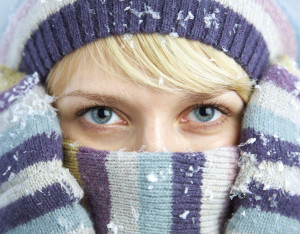TMJ Pain and Cold Weather – How to Avoid Increased Jaw Pain
January 27, 2016
Love it or hate it; the cold winter weather is here for a majority of the country. With this weather shift comes some new or increased concerns for people living with both Ehlers-Danlos Syndrome (EDS) and TMJ.
Varying seasonal temperatures prevent people living with EDS from ever fully adjusting to the weather. The stress of the cold causes constricting muscles and veins, which can put stress on many people, but more severely and adversely on those with EDS. This is likely caused by pressure changes that happen with each major season change.
TMJ sufferers can also see an increase in symptoms during colder months. Just as your hand and leg muscles may shiver and become tense during cold weather, so do jaw muscles. It may be subconscious reactions to cold weather as your body’s attempts to increase body heat, but it can also put stress on your jaw muscles and increase the TMJ pain you already experience.

Keeping healthy during the winter months can be challenging for many people, but even more challenging for people living the EDS and TMJ. So, throughout the cold winter months, how can you manage your jaw pain while also staying healthy?
-Don’t forget the cold weather gear.
During the winter months, it’s important to retain body heat to prevent the tensing and clenching of muscles and veins that accompany feeling cold. Any time you are outside, even for a short amount of time, remember to bundle up with a scarf, hat and gloves. For extremely cold days, consider wearing coats with hoods or high collars to protect your jaw from snow, wind and the cold temperatures.
-Stay warm, even inside.
It’s important to make sure your body temperature is warm even when you’re inside. This might mean turning the thermostat up a little higher than usual, turning on the electric blanket or heating pad or plugging in a space heater near your desk at work.
-Remain active.
Staying active during the winter months can be difficult. But, remaining physically active can help with not only your overall health, but also your jaw pain. Inactivity causes muscles to become weak and tight, contributing to increased pain. By remaining active, your joints and muscles are loose, strong and better prepared to handle the cold weather and changes in pressure.
At the TMJ Treatment Center, we want to help you fully understand your condition and the triggers that may cause additional pain or discomfort. If you have been experiencing increased TMJ or EDS pain this winter, contact us to set up an appointment.




 Review Us
Review Us  Categories
Categories